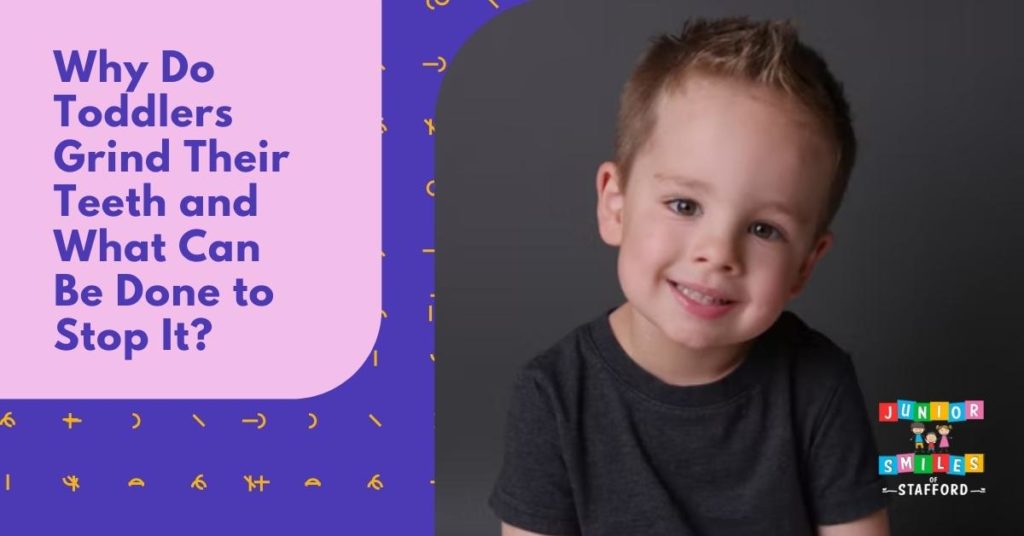The Comprehensive Guide to Understanding and Managing Toddler Teeth Grinding

Teeth grinding in toddlers, sometimes called bruxism, is one of the many problems and worries of parents that come with the stage of development of their child. In this blog post, we will provide you all the information you need to know about toddler tooth grinding, including what it is, how it affects your child’s oral health, and how to prevent and relieve it. Join me as I take you on an educational adventure that will equip you to make sure your child has a beautiful grin.
What is Toddler Teeth Grinding
Bruxism, or teeth grinding in toddlers, happens when kids clench or grind their teeth together uncontrollably, usually while they’re sleeping or feeling frightened or disturbed. Parents may be worried about their child’s oral health if they notice this behavior, especially if they hear a loud grinding sound. For the sake of your child’s developing teeth and comfort, it is important to know why your toddler may grind his or her teeth, what impact it may have on his or her oral health, and how to manage or ease this activity.
Causes of Teeth Grinding in Children
Children often grind their teeth, a condition known as bruxism. In order to manage and treat this behavior, it is crucial to understand what causes it. Although every child’s situation is unique, there are a few commonalities among those who grind their teeth:
Occlusal Issues
When a child’s upper and lower teeth aren’t properly aligned, a condition known as malocclusion, it can lead to teeth grinding. As the youngster tries to find a more comfortable posture for their jaw, grinding may occur if their teeth do not fit together properly.
Stress and Anxiety
Anxiety and stress can manifest in children just like they do in adults. As a coping mechanism, teeth grinding during sleeping might be a sign of increasing stress levels caused by things like academic pressures, social difficulties, or changes in the family dynamic.
Teething
During the teething process, which occurs in toddlers and young children, new teeth erupt through the gums. They grind their teeth to alleviate the ache, which can be rather unpleasant at times.
Sleep Disorders
Children may grind their teeth as a result of sleep disorders including snoring or sleep apnea. Their sleep patterns may be disrupted by these disorders, which can cause them to grind their teeth unconsciously as their body searches for a more comfortable position.
Mouth Breathing
Teeth grinding can be a coping mechanism for children who breathe through their mouth rather than their nostrils. Allergies, sinusitis, or swollen adenoids are some of the underlying conditions that could cause this.
Effects of Teeth Grinding
Adults and children alike suffer from bruxism, the medical term for teeth grinding. Even while it might not seem like a big deal at first, grinding your teeth on a regular basis (particularly if you don’t get treatment) can cause a host of problems. Taking proactive measures to address and manage this illness requires a thorough understanding of these potential outcomes.
Dental Damage
The wear and tear on tooth enamel is the first and most obvious consequence of grinding one’s teeth. The teeth may become shorter, duller, or flattened as a result of this. Chipped or broken teeth might be the result of grinding with too much force, necessitating dental work like fillings or crowns. As time passes, the enamel of the teeth may become more vulnerable to the damaging effects of acidity, heat, and acidic foods and drinks.
Sleep Disorders
The capacity of a child or an adult to get a pleasant night’s sleep might be further complicated by the presence of bruxism, which can be related with other sleep disorders such as sleep apnea.
Headaches and Earaches
Muscle stress and strain caused by grinding one’s teeth can lead to tension headaches, which manifest as a dull ache in the temples or forehead that doesn’t go away. Pain in the jaw and face muscles can go to the ears, creating a fullness or aching sensation in those areas.
Jaw and Facial Pain
Problems with the temporomandibular joint (TMJ) might develop as a result of the repetitive tension that bruxism causes. Jaw pain, trouble opening and closing the mouth, and popping or clicking noises when the jaw is moved are all possible outcomes of this. Grinding your teeth can irritate the delicate tissue in your face, particularly in the areas surrounding your jaw and temples.
Managing Teeth Grinding in Children
When youngsters grind their teeth excessively, a condition known as bruxism, it can cause a host of dental problems if not addressed. Thankfully, there are a number of tried-and-true methods for controlling this tendency and protecting your child’s teeth and gums.
Dental Check-Up
Make sure your youngster has frequent dental checkups. A dentist can determine the severity of tooth wear, look for cavities or other dental problems that could be causing grinding, and suggest solutions.
Stress Reduction Techniques
Find out what’s causing your child stress and help them develop coping mechanisms if anxiety or stress is a concern. Motivate people to practice relaxation techniques that can help them relax, such as deep breathing, light yoga, or mindfulness.
Behavior Modification
Encourage healthy dental practices and deter clenching. To help alleviate bruxism, talk to your youngster about the dangers of nail-biting and chewing on things that aren’t food. Congratulate them on trying to change their behavior.
Dental Appliances
In some cases, a dentist may recommend the use of a dental appliance to protect your child’s teeth from the effects of grinding. This means that they should be wearing a mouth guard or splint at night to create a barrier between the upper and lower teeth, preventing further damage.
Monitoring Diet
Pay close attention to what your youngster eats, especially before bed. Since sugar and caffeine might keep children awake and make their bruxism worse, it’s best to avoid giving them these things right before bed.
Fix Your Child’s Teeth Grinding with Junior Smiles
Remember, early intervention and consistent care are key to addressing bruxism effectively and safeguarding your child’s oral health. If you notice persistent teeth grinding or are concerned about its impact, don’t hesitate to seek professional advice from a pediatric dentist or healthcare provider.
At Junior Smiles, your child’s dental health is our top priority. Our experienced pediatric dentists in Stafford, VA are dedicated to providing the best care and guidance for your little one’s growing smile. If you have any concerns about your child’s teeth grinding or need expert advice on their dental health, schedule an appointment with us today. Together, we can ensure your child enjoys a lifetime of healthy and beautiful smiles.

